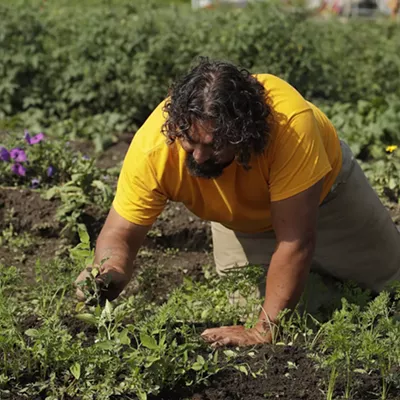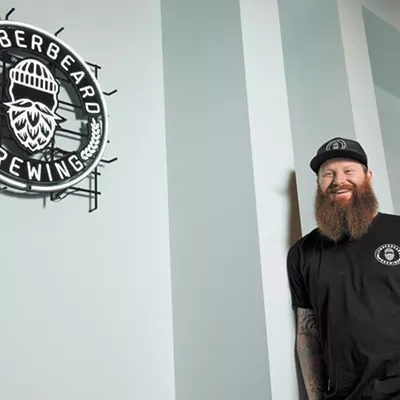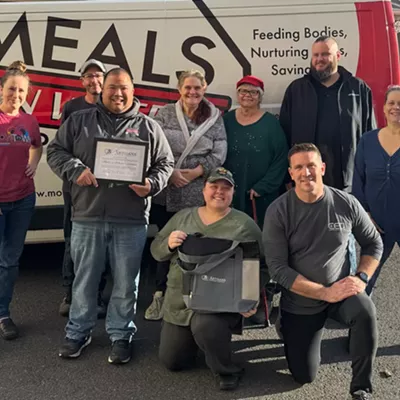A fluffy white labradoodle named Oscar struts around Echo Springs, a transitional living facility for young adults, and his presence relieves the tension in the room.
Little would anyone know that Oscar used to be an aggressive dog. He was rescued by Faithful Fields, a nonprofit started last year that's dedicated to rehabilitating dogs and then finding them new homes. Faithful Fields uses unique and in-depth methods to aid their rescue dogs in unlearning old habits and patterns that got them in trouble.
Even for dogs with serious behavior issues, Richie Alaniz, the director of operations for Faithful Fields and owner of Faithful K9 Trainer, uses positive reinforcement in his training.
"We believe that dogs are thinking dogs," he says. "Dogs can learn over 100 words, phrases, sentences, and we want them to self-correct versus being forced. And that's what changes the whole dynamic."
Alaniz has a natural understanding with dogs — he started working with and training dogs as a kid — and opened Faithful K9 Trainer in August 2021.
"I don't like to call myself a dog whisperer, but I'm very good with dogs," he says. "It's just a natural thing."
Dogs coming to Faithful Fields undergo assessments to determine their health, triggers and temperament so that Alaniz and his team can find the best way to train and rehabilitate each individual dog.
"It's the people that turn their dogs bad, they reward the wrong things," he says. "If you try to do these other correction things, it most definitely will make it worse, and it could potentially make them aggressive, and that's why I don't do any of the shock collars, prong collars, anything like that."
President and founder of Faithful Fields Geraldine Schneider hired Alaniz as a trainer for her dog, which required specialized training due to her late husband's Parkinson's disease and the accommodations that came with his treatment.
"I decided to start a nonprofit partnering with Richie so that we could rescue these dogs and help rehabilitate them," she says. "Then we can pair the dogs with people in need, whether it is foster families, therapists in the area who want a pet of their own — they can take the dog to the office if it's the right temperament — or veterans with PTSD."
Faithful Fields aims to train many of their rescues to be service animals, a process that requires 300 to 360 hours of training, but they hope to aid all of their dogs in finding a suitable home with a family that can meet their unique needs.
"If you're going to get a dog from us, you'll know about the dog," Alaniz says. "You'll know exactly what their temperaments are, if they're going to be reactive to anything. You're going to know the history of the dog."
MUTUAL BENEFITS
Faithful Fields also partners with Idaho's state prison in Orofino to have inmates train rescued dogs for two or three months.
Each dog is paired with two prisoners, one serving as a primary trainer and the other as a secondary. Those inmates spend every day with the dogs and go to two training sessions, followed by some well-deserved playtime.
"I have them switching off throughout the program because I want them to be OK being handled by other people," says Alaniz.
Not all of Faithful Fields' dogs go to the prison for training, says Alaniz. Some have triggers or issues that require more in-depth work from himself or his staff, or they may get adopted before going through the program if the team finds a good fit.
While rehabilitating the dogs is Faithful Fields' primary goal, the long-term impact of the training program for the inmates is another major focus for the team.
"They now have this loving companion, and they're learning how to also work as a team with another inmate," says Schneider. "It starts to change the personalities of these guys as well, and that's just what I think is just incredible, too, especially because you've got a lot of young people that have entered into the prison system at a young age."
Schneider became a foster mom after her husband's death, and seeing her foster children interact with and find comfort from her dog inspired her to start Faithful Fields.
"I have seen such a parallel, to be honest, with foster kids and the rescue dogs, because they've both either been abandoned or abused," she says. "With the dogs at least, and partnering with Richie, he can help me evaluate these dogs and rehabilitate these dogs."
Each dog that is rehomed is fostered by their new owner for a month to make sure it's the right fit.
"Let's say for whatever reason it's like me and this dog, it's just too much, or I can't do it," Alaniz says. "We want it to work for you, but if it's not, then you know, let somebody else get the dog or maybe we can find you another dog."
Once a new owner is matched with a dog, they commit to coming to training classes to help the adoptees maintain Faithful Fields' past training and to help resolve any concerns or issues that come up over time. Potential owners are also provided with supplies and food for the first month of fostering to help alleviate any stress or avoidable challenges.
Adoptee Chris Arnold is a veteran who was searching for a service dog that could live at home with herself, her child and her other pets, while also supporting her through her own health struggles.
Arnold is working with Alaniz to continue training her dog Rue, and says the constant communication and support she's received from Faithful Fields has made her more confident to adopt Rue.
"She's lowered my blood pressure in the last month, she's lowered my anxiety," Arnold says. "She's helped me immensely." ♦


























